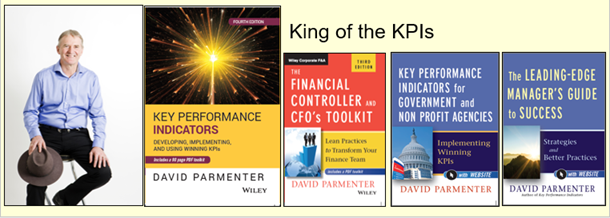By David Parmenter

1. Get your next month-end reporting to three working days or less
I have a method that has helped hundreds of organizations get to reporting within three days. It really comes down to common sense, which, unfortunately, is not that common. There are a number of practices you should adopt immediately, and these are outlined in my toolkit “Fast Close: A guide to rapid month-end and year-end reporting”.
2. Get your next year-end signed off by the auditors within 15 working days of year-end
The key to a quick year-end is to utilize the same practices of quick month-end and tell the finance team that the month-12 result is the year-end result and will not be adjusted.
Technology needs to be optimized with the use of consolidation tools. There also needs to be a ‘document and disclosure management system’ to control the “last mile” of information gathering. These systems not only store the source documents but also link any changes automatically to the document, so everything is up to date. All spreadsheets of over 100 rows should be replaced with reliable fast close, reporting, or consolidation applications.
3. Adopt the Scrum methodology
One technique that is important for the finance team is to adopt the “Scrum” methodology (named for a software development process based on collaboration within cross-functional teams). Each day, during the month-end or year-end close, the finance team members involved gather in a stand-up meeting. The meeting is held every day during the deadline period, first thing in the morning and lasts less than 15 minutes. Participants are asked to talk about: What they did yesterday, What they are doing today and What are the barriers to progress.
4. Replacing Julius Caesar’s calendar
Julius Caesar gave us the calendar we use today (with a few helpful tweaks from Pope Gregory in the 16th century). It is not a good business tool because it has divided up the year into uneven periods. With the number of weekdays and weekend days in any given month being different from the next month, it is no wonder that forecasting and reporting is unnecessarily compromised. All organizations, whether in the private, government or not-for-profit sectors, will, at some time migrate to 4,4,5 week quarters.
5. Abandoning processes that do not work
Peter Drucker believed that abandonment is the key to innovation, saying, “Don’t tell me what you’re doing; tell me what you’ve stopped doing.”In finance, many processes are followed, year-in and year-out, because “it’s the way things have always been done.”
6. See the future clearer – by using rolling planning
Without any doubt, rolling planning is one of the most important changes that an accountant can make. There are a number of practices you should adopt immediately, and these are outlined in my toolkits “How to implement quarterly rolling forecasting and quarterly rolling planning – and get it right first time” and “How to implement a forecasting and planning tool and get it right the first time”.
7. KPIs needs a total rethink
Deriving measures is often viewed as an afterthought. Measures are regarded as something we fill into a box to say we have achieved a goal. I firmly believe that performance measures exist for a higher purpose — to help align the staff’s daily actions with the organization’s critical success factors (CSFs). There are less than 10 KPIs in an organisation, the other measures being either result or performance indicators. A new approach is outlined in my toolkit “How to implement winning KPIs”
8. Be a follower of the paradigm shifters
Much has already been commented on about what a future-ready organization is by the pathfinders, or as I call them, the “paradigm shifters.” I am referring to the great management thinkers including Peter Drucker, Jim Collins, Jeremy Hope, Gary Hamel, Tom Peters, Robert Waterman and Jack Welch. The problem has been that the pathways they have made for us have not been used.
9. Selling the change
Selling change within an organization, as most of us know from experience, is not easy and often prone to failure. I would argue that more than half the initiatives that are declined were undersold. In other words, given the right approach the initiative would have gone ahead. Selling change requires a special set of skills and we all can, and should, get better at it.
Next steps
To implement these steps you should purchase one or more of these toolkits. Here are a sample of them. All of these will guarantee you improvements if implemented.
Lean Practices to Transform Your Finance Team – Toolkit (120 page Whitepaper + electronic templates)
One-Page Finance Team Reporting Templates (90 page Whitepaper + electronic templates)
20+ System Improvements for the Finance Team – Toolkit (100 page Whitepaper + electronic templates)
50+ Ways To Improve Accounts Payable – Toolkit (70 page Whitepaper + e-templates)
